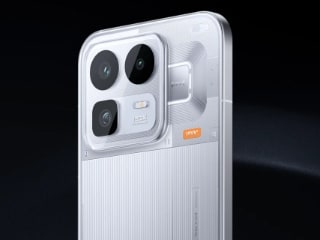- Home
- Mobiles
- Mobiles Reviews
- Nothing Phone 2a Review: Something New
Nothing Phone 2a Review: Something New
The Nothing Phone 2a gets a new design.

Nothing Phone 2a’s design is definitely catchy, again
In a short span of time, Nothing has come a long way, and it now actually stands for something. The company makes good mid-range and upper mid-range smartphones that can be total value for money. With the Nothing Phone 2a, things are new and different. While you get a similar experience with a unique design, everything has been toned down a little. The upside is that the price is now in the budget-premium segment.
I have been testing (mostly the Glyph interface; just kidding, I tried everything) the Nothing Phone 2a over a span of a week. Should it be your next buy? Let's find out.
Nothing Phone 2a price in India
As usual, I'll start with the price, which is the most important aspect of the Nothing Phone 2a. The handset is priced at Rs. 23,999 for the base variant with 8GB RAM and 128GB storage. Want more storage? You'll need to spend Rs. 25,999 for the 8GB RAM and 256GB variant or Rs. 27,999 for the 12GB RAM and 256GB storage.
The handset is available in two colour options – White and Black. Both variants have a transparent back panel made from plastic, which is both slippery and prone to fingerprints.![]()
In the box, which is made from recycled materials, you get the phone, some paperwork, a USB Type-C to Type-C charging cable, and a SIM ejector tool, which is similar to what you get with the Phone 1 and Phone 2. The charging cable also has some transparent elements, making it one of the coolest in-box cables I've seen to date. Nothing also pre-applies a screen protector on the Phone 2a.
Nothing Phone 2a Review: Design
I'll keep this section short. The Nothing Phone 2a looks good, and there are no two ways. Nothing has tweaked the rear design for the Phone 2a and removed several LEDs to keep things minimal. Compared to the previous Nothing Phone 1 and Phone 2, this phone has only three LED strips at the back, and I think that's plenty.![]()
The rear camera placement is also different compared to the previous Nothing phones. The dual camera setup is now placed at the centre of the phone inside the NFC coil. The transparent panel also shows some flex cables above the battery. The Nothing Phone 2a has 90-degree sides, rounded edges, and a flat frame, all of which make the phone comfortable to hold. The power button is on the right side, whereas the volume is on the left, and both are easily accessible even when using the phone in one hand. The buttons could've been a little more clicky, though. The bottom houses the USB Type-C port, a speaker, a microphone, and the SIM card tray, whereas the top only has the second microphone.
Nothing claims that it has used 100 percent recycled aluminium for the mid-frame. The phone also features plenty of recycled tin, copper foil, steel, and plastic parts. It feels well-built and has a good weight to it. However' the rear transparent panel is plastic, and is bound to be prone to scratches. We'll have to see how it fares in the long-term if used without a case. ![]()
Moving over to the front, Nothing has managed to keep the bezels symmetrical, which gives the phone a premium look. More brands should do this. The bezels are thin, similar to what you'd see on an iPhone. A hole punch cutout at the top centre houses the front camera and an in-display fingerprint scanner. The Nothing Phone 2a carries an IP54 rating for dust and water resistance. Honestly, I think they could've done better, as a couple of phones in the same price bracket deliver a higher rating.
Nothing Phone 2a Review: Specifications and software
When it comes to specifications, the Nothing Phone 2a is a mid-range handset. It is equipped with a custom MediaTek Dimensity 7200 Pro SoC that's built using TSMC's 2nd generation 4nm process technology. Nothing claims that the custom chip improves efficiency by 10 percent, and we think it does. The chipset is paired with up to 12GB RAM, which can be expanded to up to 20GB using the RAM Booster feature. The phone also features up to 256GB of storage.![]()
The Nothing Phone 2a supports 5G dual-mode, dual-band Wi-Fi 6, Bluetooth 5.3, NFC, and the usual GPS standards for connectivity. You get a dual-SIM slot on the phone, and weirdly, it asked us to insert an Indian SIM when we were setting up the phone for the first time. The phone gets an in-display fingerprint scanner that works as expected. Nothing has packed a 5,000mAh battery, which is the largest battery ever used on a Nothing Phone. It also supports 45W fast charging, but there's no included charger in the box.
Let's get to the software side of things now. The Nothing Phone 2a runs Nothing OS 2.5 based on Android 14. We received two software updates during our review to improve the phone and camera performance. As for software support, Nothing promises three years of OS updates and four years of security patches.![]()
In terms of features, the Nothing OS is similar to what we've seen on the Nothing Phone 2. There's a Smart Clean feature that can clean unused system files, you get NTFS optimisations, a RAM booster that supports up to 8GB virtual RAM expansion, and a HyperEngine 5.0 that's aimed to improve gaming performance. You also get Nothing-designed widgets, an AI wallpaper generator, and, best of all, no bloatware. The Nothing icon pack is also a great way to reduce phone usage, as it uses monochrome elements that make you not want to use apps.
Finally, the party trick of the Nothing Phone is the Glyph interface. With the Phone 2a, Nothing revamped the Glyph interface once again, but this time, it reduced the number of LED strips. It's still white, but there's only three of them now. However, you can still do most of what the Glyph interface was designed for.![]()
The Phone 2a supports 15 Glyph functions. You can use it for a timer, Flip to Glyph for notifications, a camera shutter countdown, a progress bar for Zomato, Uber, and Google Calendar, a volume indicator, and music visualisation. I enjoyed using the music visualisation feature when playing music on the phone. Unfortunately, it doesn't work on audio playing outside of the phone.
Nothing Phone 2a Review: Performance
The Nothing Phone 2a, for the first time in Nothing history, comes with a MediaTek processor. It gets a mid-range custom Dimensity 7200 Pro SoC that is plenty good for daily use and gaming and can offer excellent battery life. The benchmark results aren't going to top any lists, but we did run the usual benchmarks just to find out. On AnTuTu, the Phone 2a scored 6,88,079 points, which is nothing surprising. Results were similar when we ran Geekbench 6 on the phone, only to get a single-core CPU score of 1,100 and a multi-core score of 2,448. As for GPU performance, the handset scored 3,231 on Geekbench.![]()
This is a capable chipset for daily usage, and I never faced any major lag or stutter when using the phone throughout the review period. The phone is smooth overall, and this is also thanks to the display.
Nothing has equipped the Phone 2a with a 6.7-inch flexible AMOLED panel that offers full-HD+ resolution, 30-120Hz refresh rate, 10-bit colour, 240Hz touch sampling rate, and up to 1,300 nits of peak brightness. The display is easy to read outdoors, even under direct sunlight, and gets plenty of bright indoors. It offers two colour modes, namely ‘Alive' and ‘Standard', with the former option producing punchier colours. The viewing angles on the panel are good, and there's no washing effect.![]()
For audio, Nothing has included stereo speakers on the Phone 2a. The speakers get loud enough but pack a punch. There is good stereo separation and no cracking, even at full volume. As for the microphone quality, everything is also good in that department.
In terms of gaming, the Phone 2a performed well and gave me very good frame rates on games such as Asphalt 9 and BGMI. It won't play the latter at full blast, but you can definitely play all kinds of games on the phone. Nothing has used a 3,200 mm2 vapour chamber in the phone to keep the phone cool when gaming or using the camera. I did not notice excessive heating during a 30-minute session of BGMI, nor while I was using the camera outdoors in 32-degree Celsius heat.
Coming to the battery performance, I was consistently getting almost two days of battery life with minimal to moderate usage. With heavy usage, I could still get more than a day's battery life from the Nothing Phone 2a. Since Nothing didn't provide a charger in the box, I was forced to use a 30W charger, which topped the phone from 0 to 100 percent in about 1 hour 35 mins. Nothing claims that the phone can be charged from 0 to 100 percent in 59 minutes using a 45W charging adapter.
Nothing Phone 2a Review: Cameras
The Nothing Phone 2a has a dual camera setup, similar to the other two Nothing handsets. However, the camera placement is different this time around. It has a 50-megapixel primary rear camera with OIS and an f/1.88 aperture, and another 50-megapixel ultra-wide sensor with a 114-degree field of view. For selfies, there's a 32-megapixel front camera that's also used on the Nothing Phone 2.![]()
Nothing's camera app is simple and easy to use. You get all the modes front and centre with the settings available using a simple swipe down on the viewfinder. There's Slo-mo, Time-lapse, Pano, Portrait, Night mode, Motion capture, and an Expert mode. There's also a Google Lens button available next to the Shutter button.
The primary camera performed well in daylight, but it had issues in terms of HDR. In super bright conditions, the 50-megapixel sensor overexposed the bright parts of the scene. This was not the case with the ultra-wide camera, which exposed the scene better. In low-light conditions, the primary camera continued to perform good. The details, exposure, and colours were all good and mostly true to life. There was not much over-saturation going on.
Coming to the ultra-wide camera, again, the sensor performed decently in daylight and low-light conditions. The colour tuning was different when compared to the main camera. Let the samples do the talking.![]()
![]()
Top - Daylight sample 1x 12-megapixel resolution
Middle- Indoor and Outdoor 50-megapixel full resolution photos
Bottom - Ultrawide, Main, 2x in-sensor zoom (Daylight and lowlight)
There's no telephoto camera on the phone, but you get a 2x zoom option, which takes decent shots. The Portrait mode also allows for 1x and 2x crop and offers good edge detection most of the time.![]()
As for selfies, the photos taken from the camera provide good detail in daylight, with some of the details getting lost in low-light conditions.![]()
Video performance is good, with plenty of details, good colours, and dynamic range in daylight conditions. Stabilisation is also pretty good. In low light, the camera performance is decent at best, with artefacts making an appearance. The primary camera lets you shoot in either 4K 30 fps or 1080p 60 fps. Slow-motion videos max out at 1080p 120fps.
Nothing Phone 2a Review: Verdict
The Nothing Phone 2a, an affordable offering from the company, has to take on plenty of other similarly priced phones in the segment. You have the Poco X6 Pro, the Redmi Note 13 Pro, the Realme 12 Pro, and a bunch of others that offer similar or better performance. However, where the Nothing Phone 2a truly stands out is in the design and software department. You get clean software with three years of promised Android OS upgrades and a unique design. The phone also has a great screen and build quality.
For Rs. 23,999, I'd recommend the Nothing Phone 2a to those who want a unique device with clean software, good cameras, and excellent battery life. Those looking for pure performance should look elsewhere. Nothing has priced the Phone 2a really well, and I reckon it's going to sell like hotcakes. It's something new, and we like it!
Catch the latest from the Consumer Electronics Show on Gadgets 360, at our CES 2026 hub.
Related Stories
- Samsung Galaxy Unpacked 2025
- ChatGPT
- Redmi Note 14 Pro+
- iPhone 16
- Apple Vision Pro
- Oneplus 12
- OnePlus Nord CE 3 Lite 5G
- iPhone 13
- Xiaomi 14 Pro
- Oppo Find N3
- Tecno Spark Go (2023)
- Realme V30
- Best Phones Under 25000
- Samsung Galaxy S24 Series
- Cryptocurrency
- iQoo 12
- Samsung Galaxy S24 Ultra
- Giottus
- Samsung Galaxy Z Flip 5
- Apple 'Scary Fast'
- Housefull 5
- GoPro Hero 12 Black Review
- Invincible Season 2
- JioGlass
- HD Ready TV
- Laptop Under 50000
- Smartwatch Under 10000
- Latest Mobile Phones
- Compare Phones
- Realme Neo 8
- OPPO Reno 15 FS
- Red Magic 11 Air
- Honor Magic 8 RSR Porsche Design
- Honor Magic 8 Pro Air
- Infinix Note Edge
- Lava Blaze Duo 3
- Tecno Spark Go 3
- Acer Chromebook 311 (2026)
- Acer Chromebook Spin 311
- Lenovo Idea Tab Plus
- Realme Pad 3
- Moto Watch
- Garmin Quatix 8 Pro
- Haier H5E Series
- Acerpure Nitro Z Series 100-inch QLED TV
- Asus ROG Ally
- Nintendo Switch Lite
- Haier 1.6 Ton 5 Star Inverter Split AC (HSU19G-MZAID5BN-INV)
- Haier 1.6 Ton 5 Star Inverter Split AC (HSU19G-MZAIM5BN-INV)


















